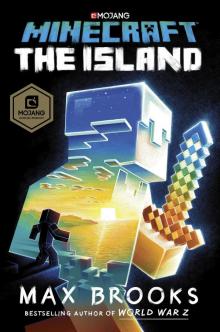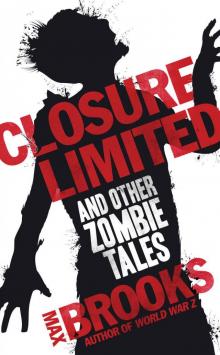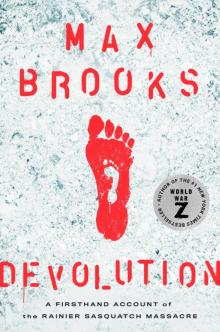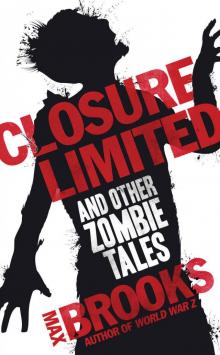- Home
- Max Brooks
Devolution: A Firsthand Account of the Rainier Sasquatch Massacre Page 2
Devolution: A Firsthand Account of the Rainier Sasquatch Massacre Read online
Page 2
RYSSDAL: Talk for a minute about this “revolutionary living.” In the past you’ve described Greenloop as the next Levittown.
TONY: It is. Levittown was the prototype for prosperity. You had all these young GIs coming home from World War II, newly married, anxious to start a family, hungry for a home of their own, but without the means to afford one. At the same time, you had this revolution in manufacturing; streamlined production, improved logistics, prefabricated parts…all from the war, but with tremendous peacetime potential. The Levitts were the first to recognize that potential and harnessed it into America’s first “planned community.” And they built it so fast and cheap that it became the model for modern suburbia.
RYSSDAL: And you’re saying that model’s run its course.
TONY: I’m not the one saying it, the whole country’s acknowledged it as far back as the 1960s when we realized that our standard of living was killing us. What good is all this progress if you can’t eat the food or breathe the air or even live on the land when the ocean rises up over it? We’ve known for half a century that we need a sustainable solution. But what? Turn back the clock? Live in caves? That was what the early environmentalists wanted, or, at least, how they came off. Remember that iconic scene in An Inconvenient Truth where Al Gore shows us a scale with gold bars on one side and Mother Earth on the other? What kind of a choice is that?
You can’t ask people to give up personal, tangible comforts for some ethereal ideal. That’s why communism failed. That’s why all those primitive, hippie, “back to the land” communes failed. Selfless suffering feels good for short crusades, but as a way of life, it’s unsustainable.
RYSSDAL: Until you invented Greenloop.
TONY: Again, I didn’t invent anything. All I did was look at the question through the lens of past failures.
RYSSDAL: You’ve been very critical of previous attempts…
TONY: I wouldn’t call it critical. I wouldn’t be here if it wasn’t for those who came before me. But you look at those huge, government funded eco-cities like Masdar*2 or Dongtan.*3 Too big. Too expensive. And definitely too ambitious for a post Sequestration*4 America. Likewise the smaller, Euro models like BedZED*5 or Sieben Linden*6 are nonstarters because they depend on punishing austerity. I liked the Dunedin*7 project in Florida. It’s comfortable and manageable, but it just doesn’t have any wow, and this…
RYSSDAL: We should note that Tony is gesturing to the houses and land around us.
TONY: Tell me this isn’t the definition of “wow”?
RYSSDAL: Is the story true about you hijacking a Cygnus corporate retreat and pitching the project only after you’d hiked them up here?
TONY: [Laughs.] I wish. They knew a sales pitch was coming, and they knew it had something to do with a plot of land that the federal government was planning to auction off to the private sector, but they didn’t hear my proposal until we were standing…actually…on the very spot we’re standing now.
RYSSDAL: And nature did the talking.
TONY: And me. [Both laugh.] Seriously, like Steve Jobs playing the orchestra,*8 my orchestra is this land. When you’re here, surrounded by it, connecting to it on a visceral level, you realize that that connection is the only way to save our planet. That’s been the problem all along, destroying the natural world because we’ve created so much distance from it.
I asked my friends at Cygnus to imagine two different endgames for this soon to be privatized land. Clear-cutting by a Chinese timber company or…or…the minimal footprint of a micro-eco-community that personified the new Green Revolution. Six homes, no more, ringing a common house in the top-down shape of a turtle, which, according to some Native American beliefs, is the foundation on which the world is built.
I described how the Tlingit-style houses would look like they literally grew right out of the forest.
RYSSDAL: Which you can see now.
TONY: Exactly, but what you can’t see is that these homes are all built from 100 percent recycled materials. Wood, metal, insulation are recycled blue jeans. The only new material is the bamboo for the floors. Bamboo’s really important to the planet. That’s why you see it growing all around the neighborhood. Not only is it one of the most versatile and renewable building materials ever, it also helps to sequester carbon. There are also what you’d call “passive elements,” like the giant floor-to-ceiling windows in the living room that allow you to warm or cool the whole house by raising or lowering the curtains.
But passive elements only go so far. When it comes to active, green technology, we’ve got it all. See how the roofs have this bluish-purple tint? Those are solar panels. Peel and stick, like old-fashioned wallpaper, and “triple junction” so they can harvest every photon on a cloudy day. And those converted amps are stored in Cygnus’s patented battery that not only fits invisibly into a wall, but is 13.5 percent more efficient than the competition’s.
RYSSDAL: Suck on that, Elon Musk.
TONY: No, no, I love Elon, he’s a good guy, but he does have some catching up to do.
RYSSDAL: Like the solar profit program?
TONY: Exactly. If you harvest more energy than you need, why not be able to sell it back to the grid? And I don’t mean a rebate like in some states, I mean sell, for cash, just like the Germans have been doing for almost two decades. That’s not technology, that’s just good business, making money while you sit on your ass.
RYSSDAL: And speaking of sitting on your…
TONY: I was getting to that. The houses don’t just harvest sunlight, they also collect methane gas from, wait for it, your own poop. Again, nothing new. Biogas has been used in developing countries for years. Even some American cities are tapping into the deposits from their own landfills. Greenloop’s taken all that hard-won experience and kicked it up to American suburban standards. Each house is built on a biogas generator that breaks down what you flush. But you don’t see it, or smell it, or even have to think about it. Everything is regulated by the Cygnus “smart home” system.
RYSSDAL: Can you talk a little bit about that system?
TONY: Again, nothing new. A lot of homes are getting smarter. Greenloop’s just gotten there faster. The central home program is either voice or remote activated, and with a constant eye toward energy efficiency. It’s always thinking, always calculating, always making sure you don’t waste one amp or Btu. Every room is riddled with both thermal and motion sensors. On the highest efficiency setting, they’ll automatically shut down all light and heat to every unoccupied space. And you don’t have to do anything more than just live the way you’ve always lived. You don’t have to sacrifice an ounce of comfort or time.
RYSSDAL: And that goes back to the same political will that allowed Washington State to change its solar energy policy.
TONY: And put up half the money for its construction, and built the private road up from the main highway, and laid all those miles of fiber-optic cable.
RYSSDAL: Green jobs.
TONY: Green jobs. Who keeps all those fancy electronics running? Who cleans off the solar panels? Who mucks out the used-up waste in those biogas generators, carting it away along with the garbage and recycling and kitchen scraps, only to bring that organic waste back as compost to be spread around the fruit trees?
You know that every citizen of Greenloop generates between two and four service jobs for their fellow Americans? All bused in on electric vans that charge up at the Common House. And that’s just the service sector. What about actually building those solar panels and biogas generators and wall batteries? Manufacturing. Made in America. This is the Green Revolution, the Green New Deal, and what they’re now calling the Green Green Society. Greenloop shows what’s possible, just like Levittown did before it.
RYSSDAL: Although, we can’t ignore that Levittown had a racial segreg
ation policy.
TONY: No, we shouldn’t ignore it. In fact, that’s exactly my point. Levittown was exclusive; Greenloop is inclusive. Levittown wanted to divide people. Greenloop wants to unite them. Levittown wanted to separate humans from the natural world. Greenloop wants to reintroduce them.
RYSSDAL: But most people can’t afford to live in this type of community.
TONY: No, but they can afford a piece of it. That’s what Levittown was all about, not just showcasing the homes, but every new convenience that was in it: automatic dishwashers, clothes washers, television. A whole way of life. That’s what we’re trying to do with Greentech, and as far as solar power and smart homes, it’s already happening. But if we can put all these planet-saving ideas under one roof, literally, and plant just enough Greenloops around the country for those ideas to trickle down to the general public, then we’d finally have our Green Revolution. No more sacrifice, no more guilt. No more conflict between profit and planet. Americans could have it all, and what’s more American than having it all?
*1 Kate McCray grew up in Columbia, Maryland.
*2 Masdar City: A sustainable city project built in Abu Dhabi, UAE.
*3 Dongtan: A planned eco-city on Chongming Island, in Shanghai, China.
*4 Sequestration: An act of budget austerity controls set in place by the Congress of the United States in 2013.
*5 BedZED: A sustainable community of one hundred homes completed in 2002 in Hackbridge, London, UK.
*6 Sieben Linden: An off-grid settlement in Germany.
*7 Dunedin: An Eco Home Village in Dunedin, Florida, USA.
*8 While “I play the orchestra” was spoken by Michael Fassbender and written by Aaron Sorkin for the 2015 movie Steve Jobs, it cannot be confirmed that Jobs himself ever uttered this phrase.
Happiness: a good bank account, a good cook, and a good digestion.
—JEAN-JACQUES ROUSSEAU
JOURNAL ENTRY #2
September 23
Last night we were invited to a “welcome potluck” in the Common House.
I realize I haven’t explained that building at all. Sorry. It’s like any planned community’s homeowners association shared space and laid out like a traditional Pacific Northwest longhouse. I googled “longhouse” last night. The images almost match this structure. It’s got a large, multi-use space with a bathroom and kitchenette on one side and a cozy cobblestone fireplace on the other. That fire gave off such a beautiful glow, mixed with the pine candles and the natural light of dusk. The Common House runs east–west, so all we had to do was leave the large, double front doors open for that spectacular view of the setting sun. I’m surprised how warm it was, certainly no colder than the nights in L.A.
It was such an idyllic setting, and the food! Black buttery edamame salad, quinoa with grilled vegetables, and salmon right from the nearby rivers! We started with this amazing soup course: vegetable soba made by the Boothes. They live two houses to the left of us. Vegan foodies. They actually made the soup, not just mixed and cooked it. The soba noodles were from scratch. Raw ingredients delivered fresh that day. I’ve had a lot of soba since moving to L.A. I’ve even had it at Nobu, where Dan and his onetime partners wanted to celebrate their company launch, and I’m pretty sure it didn’t compare to this.
“From our own hand.” That’s what Vincent says. I like him, and his wife, Bobbi. They’re in their sixties, both short and happy and look like your stereotypical aunt and uncle.
They also weren’t judgy about those of us who aren’t vegan. Does that sound judgy from me? You know what I’m talking about: all the vegans in Venice, especially the new ones. The way they’d look at Dan’s leather shoes or my silk blouse or how one of them called a fish tank a prison. Seriously, we were at someone’s house for a party and this guy totally went off on them about their koi pond. “How’d you like it if you were imprisoned in a tiny air bubble at the bottom of the ocean!” The Boothes weren’t like that. They were so nice. And Dan loved their housewarming gift.
Think of an all steel, upside-down T that you grip in the palm of your hand. The neck of the T extends through your fingers, a long, narrow, sharpened spoon tapering to a pointed edge. Bobbi explained that it’s a coconut opener, specifically for digging into the “pores.” That’s what those little black covered holes are called. Never knew that. I also never knew that coconut water is the best natural hydrator in the world. Vincent explained that it comes the closest to the liquid inside our own blood cells. Bobbi joked “not that we need homemade transfusions” but turned earnest when she explained the benefits of coconut water on a hike. They go hiking every morning and go through piles of coconuts in the summer.
“And I guess you can also poke someone’s eye out,” Bobbi added, watching Dan. He had the opener in his hand and was stabbing the air. He looked about twelve years old, and sounded like it too. “Dude, this is so sick! Thank you!”
I guess I should have been embarrassed at that point, but the Boothes just smiled at him like proud parents.
There were some actual parents there too. The Perkins-Forster family. They’ve only been here a few months and are the second to last residents before us.
Carmen Perkins is…I’m not sure she’s a germaphobe, I mean, I just met her. But the hand sanitizer. Using it right after she shook our hands, making sure her daughter used it, offering it around to everyone. She’s totally nice though. She kept saying how wonderful it was that we, Dan and I, “complete the circle.” She’s a child psychologist. She wrote a book on homeschooling in the digital age with her wife, Effie. Carmen kept calling her “Euphemia.”
Effie’s also a child psychologist, I guess. That’s how Carmen introduced her, at least. “Well, I’m not technically licensed—” Effie started to say but Carmen cut her off with a hand on her arm. “She’s working on her degree, and already a lot smarter than me,” she said, which made Effie blush a little.
I don’t know if Effie’s physically smaller than Carmen but her posture makes it look that way. Shoulders shrugged. Soft voice. Not a lot of eye contact. A couple times before answering one of our questions, she glanced quickly at Carmen. Permission? A couple times after. Approval?
Effie also spent a lot of time and attention on Palomino, their daughter. The name, according to Carmen, is a “place holder,” which they gave her during the adoption. I sensed a little bit of defensiveness, especially when Effie elaborated that a “place holder” name was something Palomino could change if she ever found one she loved more. Carmen explained that when they first met her in the orphanage in Bangladesh, she was clutching a worn and torn picture book on horses. I tried to ask her about horses, and Dan about how she liked living here. Neither of us got an answer.
You know that famous National Geographic picture of the Afghan girl with the green eyes? Palomino’s eyes are brown but have the same haunted expression. She just stared at us with those eyes and didn’t say anything for a second, then went back to her “fidgeter,” a little homemade beanbag. Effie gave her a hug and began to apologize. “She’s a little shy.”
Carmen cut her off with, “And it’s not her job to please us with conversation.” And went on to tell us about how the book was one of her only possessions, that and a loaf of bread in a plastic bag. When they met her, she didn’t know when she was going to eat again. Effie shook her head, hugging the girl again, and said she’d been so malnourished, all these vitamin deficiencies, mouth sores, rickets. She started to talk about what her people had gone through, the “Rohingya” minority (which I’ll have to google later) at the hands of the Myanmar government. Carmen shot her another silencing look and said, “But we don’t need to trigger her with those memories. What matters is she’s safe now, healthy and loved.”
That prompted Alex Reinhardt to comment on the deplorable state of many ethnic minorities in South Asia. Have you ever h
eard of Dr. Reinhardt? He looks like the Game of Thrones author, without the Greek fisherman’s hat. He does, though, wear a beret, which, I guess, he’s entitled to. I’d heard his name a couple times in school, seen his books advertised on Amazon. I think I might have caught the end of his TED Talk someone next to me on a plane was watching.
I guess he’s kind of a big deal. His book Rousseau’s Children was apparently “groundbreaking.” That’s the word Tony Durant used. Reinhardt gave a slight, almost embarrassed shrug at that, but went on to describe why it essentially launched him into the academic spotlight.
I hope I get this right. I’ll try to relate what he explained to me. Jean-Jacques Rousseau—not be confused with Henry David Thoreau as Dan did that night—was an eighteenth-century French philosopher. He believed that early humans were essentially good, but when humanity began to urbanize, separating themselves from nature, they separated from their own nature as well. In Reinhardt’s words, the “ills of today can all be traced to the corruption of civilization.” In Rousseau’s Children, Reinhardt proved him right by studying the Kung San hunter-gatherers of Africa’s Kalahari Desert. “They have none of the problems,” he said, “that plague our so-called advanced societies. No crime, addiction, war. They are the embodiment of Rousseau’s thesis.”
“And unlike Rousseau’s ideal, the women aren’t reduced to being virtuous sex slaves in a male-dominated society.” That was Carmen. She said it nicely, smiling, but with a sarcastic roll of the eyes. Effie giggled at that and Reinhardt, reaching for another helping of quinoa, looked like he might have been working up to a less than friendly comeback.

 World War Z: An Oral History of the Zombie War
World War Z: An Oral History of the Zombie War Minecraft: The Island
Minecraft: The Island The Zombie Survival Guide: Complete Protection From the Living Dead
The Zombie Survival Guide: Complete Protection From the Living Dead Closure, Limited and Other Zombie Stories
Closure, Limited and Other Zombie Stories Devolution: A Firsthand Account of the Rainier Sasquatch Massacre
Devolution: A Firsthand Account of the Rainier Sasquatch Massacre The Zombie Survival Guide
The Zombie Survival Guide World War Z
World War Z Closure, Limited
Closure, Limited The Zombie Survival Guide: Recorded Attacks
The Zombie Survival Guide: Recorded Attacks World War Z_An Oral History of the Zombie War
World War Z_An Oral History of the Zombie War The Essential Max Brooks: The Zombie Survival Guide and World War Z
The Essential Max Brooks: The Zombie Survival Guide and World War Z